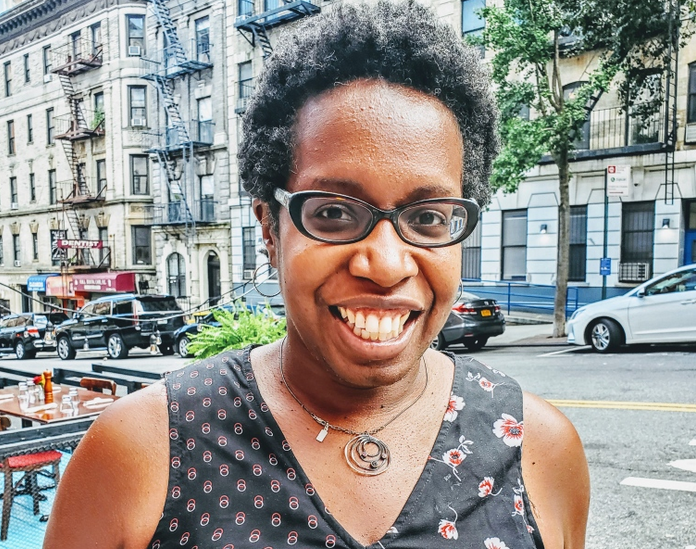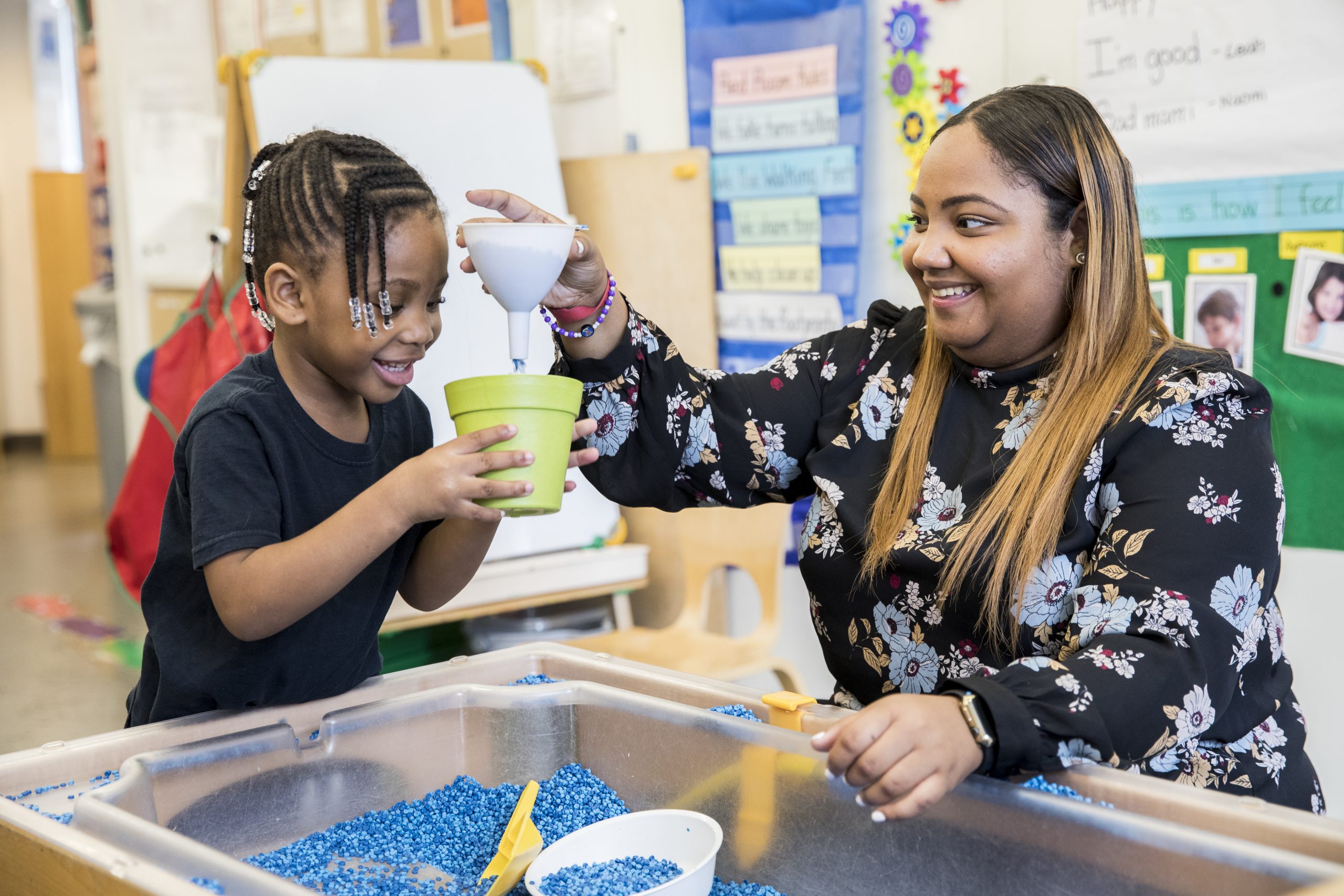The Leadership Initiative invited its members to reflect on different aspects of leadership, bringing to light unique pathways, approaches, challenges and lessons learned. TLC hopes that through this series you get to know these diverse individuals and take away an appreciation for their journeys and leadership skills and its impact on the lives of children, families, their staff and communities.
Spotlight: Michelle Boyd, Classroom Support Coordinator, Kennedy Children’s Center, Bronx. NY
What is your personal mantra?
What one thinks and what one says, that is what becomes reality. I have seen in my life that it is really important to share my truth and how I am feeling because I have seen how things have come to fruition based on how I am thinking, based on my perception. So what one thinks and one speaks is what comes into fruition.
How would you describe yourself as a leader today and what kind of leader do you want to become?
I come from a background of two social workers in my family and I have a foundation in child life psychology so intuitively my style of leadership starts with looking inward at the people I lead. I want to discover and understand who is that person, what makes up that person, what is important to that person. I do this on an individual level and then through a team dynamic lens as well. It is important as a leader that I know my teammates well and grow in my understanding of them.
As I develop further as a leader, it is especially important now with everything that is going on, that I pay more attention to my role in advocacy. I want to understand and work on the ways that I can advocate not just for my school but also the community that surrounds my school.
What is the biggest or most significant challenge that you face in your leadership?
Currently, I am in a continuous place of rethinking collaboration in the context of my role as a leader. My biggest challenge is looking within myself and reflecting on what I am doing to foster collaboration and where it is difficult for me. Identifying ways in which collaboration can get stuck, such as personality differences or challenges with communication, is important to be able to work through it and move forward. As a leader within the school I want to make sure I am eliciting and fostering collaboration across the school and the departments within the school.
How do leaders grow and get better?
I think we need to look to children and imitate them in how they learn and grow—by asking questions and having an inquisitive nature. The only way you can grow is to ask questions and have the humility to understand that mistakes are inevitable. Making mistakes, experiencing those mistakes, is part of how you grow. There is no growth without those mistakes. Embrace the lessons that come with that. We should always be searching and wanting to learn more.
How do you handle criticism?
When I am faced with criticism I always try to take a step back and look at the person’s intention and the why. When it is constructive and it is really about building up our program or our community, or even my leadership skills and craft, then I can handle it and hear it. In other words, when the intention is strengths-based. It is challenging when it is not strengths-based because what is left unknown is, “how is this going to help me grow?” It is important for leaders for to remember this as they offer feedback to others.
What is something that others can do today to make their spaces, programs, and relationships more inclusive?
People need to feel heard. Everyone is vital. It is imperative that people feel validated and heard. We are not always going to agree but do we need to have space where people can express their thoughts and ideas. If that exists, then we can come together and figure out how are we are going to proceed so that we can meet the needs of our school community. If this doesn’t exist and happen then there is a lack of trust. People will question, “Am I really valued? Am I a valued member of this community?” As leaders we always need to be thinking about this and how to build community in our spaces. My teachers have been so incredible with how they have adjusted during this time and they are adapting and doing such an amazing job with the children. I always want to make sure they feel that way and they know that I see that in them. This is so important for our sense of community and each individual’s sense of value to that community.
Any last thoughts?
We are going to get through this. It is important to me to have faith. As challenging as it is, we are going to get through this challenging time. And, what we are learning in the process will help us to become better and grow. So it is not just about getting through it but rather focusing on how is this going to help us evolve. Think about the lesson we are learning from these changes. Others have reminded me of this and I think it’s important to share that much of what we are facing and doing are things we have always done, we are just doing them in different ways.
Jenna Pettinicchi is the Assistant Director of the Leadership Initiative.




Michelle,
You are such a carling and thoughtful leader. You are humble and generous. You see mistakes are opportunities for growth for yourself and others rather than for punishment. As a leader you will make the difference in the lives of so many children, teachers, and families. I thank you.
Thanks for such encouraging article and your insights about leadership. It is a pleasure to work with you at Kennedy. I couldn’t agree more with you when you say “It is imperative that people feel validated and heard. We are not always going to agree but do we need to have space where people can express their thoughts and ideas.” We need each other to be able to give the best services and provide the best practices to our schools children, family and community.
I’m so impressed Michelle! What resonated for me is your thoughts about coming from a place of curiosity to keeping growing and learning as a leader! Thoughtful and encouraging too!!
I especially love Michelle’s words of wisdom here. Michelle insight and leadership is essential during this time.
“We are not always going to agree but do we need to have space where people can express their thoughts and ideas. If that exists, then we can come together and figure out how are we are going to proceed so that we can meet the needs of our school community. “
Congratulations Michelle on a wonderful and insightful interview. You are very thoughtful and intuitive. Keep up the amazing work.
Congratulations Michelle. It’s clear that you took away a lot from the Early Childhood Advanced Certificate program at Bank Street College. I’m delighted that you can bring that learning and experience into your work with teachers at raw Kennedy Center.
Michelle,
Your attention to our collective and individual need to be heard and feel a connection to the community resonates with me. If as a leader you are able to facilitate these two essential goals within your school community, I believe you can meet any challenge and surmount any obstacle.
Steve
Wonderful interview! I especially appreciate the “we’re” going to get through this” encouragement.
Thank you Ms. Boyd, your views are very helpful especially for me. I am getting ready to work with children and their families next year and it is very helpful to read your input on all of these tough questions. I have taken notes and will be hoping to follow in your footsteps soon. Excellent article!
Wonderful and insightful interview.